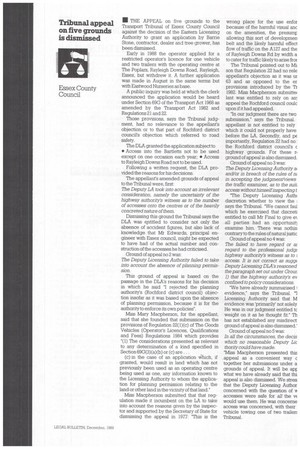Tribunal appeal on five grounds is dismissed
Page 163

If you've noticed an error in this article please click here to report it so we can fix it.
El THE APPEAL on five grounds to the Transport Tribunal of Essex County Council against the decision of the Eastern Licensing Authority to grant an application by Barrie Stone, contractor, dealer aid tree grower, has been dismissed.
Early in 1988 the operator applied for a restricted operator's licence for one vehicle and two trailers with the operating centre at The Poplars, Rayleigh Downs Road, Rayleigh, Essex, but withdrew it. A further application was made in August in the same terms but with Eastwood Nurseries as base.
A public inquiry was held at which the clerk announced the application would be heard under Section 69G of the Transport Act 1968 as amended by the Transport Act 1982 and Regulations 21 and 22.
Those provisions, says the Tribunal judgment, had no relevance to the appellant's objection or to that part of Rochford district councils objection which referred to road safety.
The DLA granted the application subject to • Access into the Bartletts not to be used except on one occasion each year: • Access to Rayleigh Downs Road not to be used.
Following a written request, the DIA provided the reasons for his decisions.
The appellant's amended grounds of appeal to the Tribunal were, first: The Deputy LA took into account an irrelevant consideration, namely the uncertainty of the highway authority's witness as to the number of accesses onto the centres or of the heavily concreted nature of them.
Dismissing this ground the Tribunal says the DLA was entitled to consider not only the absence of accident figures, but also lack of knowledge that Mr Edwards, principal engineer with Essex council, might be expected to have had of the actual number and construction of the accesses he had criticised.
Ground of appeal no 2 was: The Deputy Licensing Authority failed to take into account the absence of planning permission.
This ground of appeal is based on the passage in the DLA's reasons for his decision in which he said 1 rejected the planning authority's (Rochford district council) objection insofar as it was based upon the absence of planning permission, because it is for the authority to enforce its own policies".
Miss Mary Macpherson, for the appellant, said that she founded that submission on the provisions of Regulation 22(1)(c) of The Goods Vehicles (Operator's Licences, Qualifications and Fees) Regulations 1984 which provides "(1) The considerations presented as relevant to any determination of a kind specified in Section 69G(3)(a)(b) or (c) are . . .
(c) in the case of an application Which, if granted, would result in land which has not previously been used as an operating centre being used as one, any information known to the Licensing Authority to whom the application for planning permission relating to the land or other land in the vicinity of that land."
Miss Macpherson submitted that that regulation made it incumbent on the LA to take into account the reasons given by the inspector and supported by the Secretary of State for dismissing the appeal in 1977: 'This is the wrong place for the us 1= enfor because of the harmful visual anc on the amenities, the presum allowing this sort of developmen belt and the likely harmful effect flow of traffic on the A127 and the of Rayleigh Downs Rd by width a to cater for traffic likely to arise fror The Tribunal pointed out to Mi son that Regulation 22 had no reIE appellant's objection as it was ur 63 and as opposed to the en provisions introduced by the Ti 1982. Miss Macpherson submittei lant was entitled to rely on an appeal the Rochford council coulc upon if it had appealed.
"In our judgment there are two submission," says the Tribunal.
appellant is not entitled to rely which it could not properly have before the LA. Secondly, and pE importantly, Regulation 22 had no the Rochford district council's c highway grounds. For these 1.1 ground of appeal is also dismissed.
Ground of appeal no 3 was: The Deputy Licensing Authority al and/or in breach of the rules of ru in accepting the judgment/views the traffic examiner, as to the suit, access without himself inspecting t 'The Deputy Licensing Authc discretion whether to view the says the Thbunal. "We cannot faul which he exercised that discreti entitled to call Mr Final to give el all parties had an opportunit) examine him. There was nothin contrary to the rules of natural justic Ground of appeal no 4 was: The failed to have regard or at regard to the professional judgi highway authority's witness as to I access. It is not correct as suggE Deputy Licensing DLA 's reasoned the paragraph set out under Grour 1) that the highway authority's ev confined to policy considerations.
"We have already summarised evidence," says the Tribunal. '1 Licensing Authority said that M evidence was 'primarily' not solely He was in our judgment entitled tc weight on it as he thought fit." Th has not established any misdirect ground of appeal is also dismissed.'
Ground of appeal no 5 was: In all the circumstances, the decis which no reasonable Deputy Lic thority could have made.
"Miss Macpherson presented this appeal as a convenient way c together her submissions under a grounds of appeal. It will be ar4 what we have already said that thi appeal is also dismissed. We sires that the Deputy Licensing Author concerned with the question of vi accesses were safe for all the VE would use them. He was conceme aCCPSS was concerned, with their vehicle towing one of two trailer: Tribunal.




































































































































































